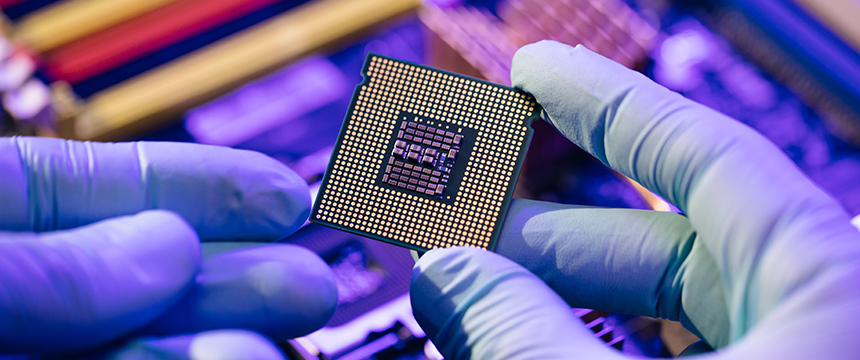Quantum Computing’s Transcendence: Impacts on Foundational Technology

With consumer-grade forms of quantum computing nearing availability, this technology has the potential to permeate every aspect of daily life by solving certain types of problems exponentially faster—in some cases performing in minutes what might take months on the most powerful classical computers. The positive impacts of such a leap in processing power, as covered in prior articles, are difficult to overstate.
Such processing power and potential also has a cautionary side. Even the best available encryption technologies may be vulnerable to being cracked in relatively short order by quantum computing, potentially leaving sensitive data vulnerable. Further, the prospect that artificial intelligence and other machine learning modules may be accelerated exponentially overnight with a shift to effective quantum computing platforms is also foreboding.
Through this lens, we consider the impact of quantum computing on three increasingly foundational aspects underpinning modern computing: hardware, artificial intelligence, and cybersecurity.
Hardware
There are various technical hurdles that need to be overcome for the use of qubits in quantum computing, including trapping neural atoms, trapping ions, operating superconductors, controlling spin qubits, and so on. These new applications, except those for spin qubits, are not compatible with traditional semiconductors. For example, superconducting quantum computers can operate only at an ultracold temperature (e.g., -272 to -253°C).
Since the hardware for presently known quantum computing modalities is fundamentally different from classical computing hardware, if consumer-grade quantum computing becomes more available traditional semiconductor companies will need to dramatically shift their focus. The needed changes will include all aspects such hardware design, manufacturing processes, and/or choice of materials. This dynamic would open opportunities for agile, disruptive new companies and would pose a significant challenge to industry incumbents.
That said, traditional semiconductor companies are also aspiring to develop semiconductor-compatible quantum computing technologies. For example, spin qubit technologies can be implemented in semiconductor circuits using the spin of electrons or holes within a semiconductor material. There are challenges, however – the process of controlling spin qubits is seriously complex and scalability is limited. Therefore, regardless of whether the standard qubit technology will be compatible with semiconductors or not, the hardware industry will likely face challenges which, if overcome, will create new business opportunities.
Artificial Intelligence
Quantum computing promises to bring transformative benefits to AI, particularly in data processing speed, machine learning, and optimization. By leveraging qubits and superposition, quantum computers can perform many calculations simultaneously, drastically reducing the time required to analyze large datasets. This acceleration enables AI systems to process information more efficiently, leading to the development of more accurate and reliable models, particularly in complex tasks such as image recognition and natural language processing. Additionally, quantum computing’s parallel computing capabilities enhance AI’s ability to solve optimization problems quickly, making it invaluable in fields like scheduling, resource management, and route planning.
Moreover, quantum computing significantly boosts AI’s simulation capabilities. In complex environments where accurate simulations are crucial, such as finance, health care, and climate modeling, quantum computing’s ability to evaluate multiple scenarios simultaneously results in more precise and realistic outcomes.
Finally, quantum computing can significantly enhance reinforcement learning by accelerating the process of exploring/exploiting vast action spaces. In reinforcement learning, agents learn optimal strategies through trial and error, which often involves processing large amounts of data and running numerous simulations. Quantum computers, with their ability to perform parallel computations and explore multiple possibilities simultaneously, can speed up this exploration, allowing agents to converge on optimal solutions more quickly. This improvement is particularly valuable where traditional computing struggles with the sheer volume of potential actions and outcomes, making quantum computing a powerful tool for advancing these applications.
Cybersecurity
Quantum computing is poised to revolutionize cybersecurity technology by introducing stronger, more resilient encryption methods that leverage the principles of quantum mechanics. Traditional encryption methods, such as RSA, rely on mathematical functions that are secure against classical computing but vulnerable to the immense processing power of quantum computers. This poses a threat to all sensitive data and systems presently guarded by these methods, including financial systems and data, communications systems, and health care data.
Quantum-based encryption, however, uses the unique properties of qubits, such as superposition and entanglement, to generate encryption keys that are fundamentally more secure. For instance, quantum key distribution (QKD) allows two parties to exchange encryption keys with absolute security, as any attempt by a third party to intercept the key would immediately alter the quantum state, thereby alerting the communicating parties to the presence of an intruder. This capability makes quantum encryption methods not just more secure, but nearly impervious to the types of attacks that threaten current encryption standards. Transitioning to quantum hard encryption is a critical, imminently needed step across industries.
Moreover, quantum computing will enhance cybersecurity by enabling faster and more sophisticated detection and response systems. As quantum computers become capable of processing vastly larger datasets at unprecedented speeds, they will allow cybersecurity tools to identify threats and anomalies more quickly and accurately. This will be particularly valuable in machine learning-based systems, where the ability to analyze and respond to massive amounts of data in real-time is critical for detecting advanced cyber threats.
Beyond The Binary Series
Click here to view Foley’s multi-part Beyond The Binary series of articles describing various aspects of quantum computing technology, its principles, and the legal landscape surrounding its development and implementations.
To subscribe to the series, click here.


